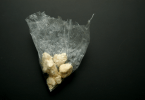Before memes came about, slogans were plastered across t-shirts and baseball caps, even on key-rings, and one of the most famous of the ‘90s was – ‘Crack is Whack’ – out of the mouth of one Whitney Houston, who suffered an untimely demise due to her cocaine abuse.
There’s no doubt that this street drug causes many problems, it’s clear that crack cocaine isn’t going anywhere, and if anything, represents as much of a problem now as it did in the 1980s, when it became widely available across the US.
If you’re living with a crack addict in your life, you may feel upset and bewildered on how to deal with it.
What is Crack?
With the same properties as powder cocaine, crack is a stimulant, which produces a short-lived high. Crack cocaine is produced by mixing powder cocaine with water and baking soda whilst heating. This process removes the hydrochloride, allowing for an oily freebase of cocaine to float over the liquid residue. When this separates, the freebase cocaine dries into a rock.
If you look at molecular structures, crack and powder cocaine are almost identical, and in the bloodstream, it isn’t possible to discern which a user has been taken, but the method’s of taking them and the strength of the hit can be quite different.
Crack cocaine vaporizes at around 90 degrees Celsius, much lower than cocaine hydrochloride, so it can be easily smoked, which is many users’ method of choice.
Whether crack cocaine is as physically addictive as opiates is a hotly debated topic, but it is certainly psychologically addictive due to it’s short-lived intense high, followed by an equally intense low that leaves users craving the positive effects of the drug again almost immediately.
The effects of crack addiction are devastating from extreme weight loss, damage to the mouth, lips and long-term heart and lung problems as well as serious cognitive decline.
How do I Know if my Loved One is a Crack Addict?
Unlike some other drugs, crack is not really a recreational drug, such as pot or ecstasy. It’s normally a drug people graduate to when they are already addicted to cocaine, because it’s cheaper and the high considered more intense.
Some people get addicted to it the first time they use it, because the high is so potent. If someone is using it, it’s likely they have developed a dependency on it so it’s a cause for concern. Paraphernalia that you might find around their place could include a smoking pipe, small glass tubes and items that have burn marks on them.
Physical signs that you can look for are:
- Periods of elation/euphoria that seem to come in short bursts
- Short cycles of over-confidence, especially if this is uncommon
- Dilated pupils
- Nosebleeds
- Burned fingers
- Blistered or burnt lips
Crack addiction can cause many psychological problems such as extreme paranoia, aggression, mood swings, hallucinations and psychotic episodes.
A crack addiction is all consuming so one of the easiest ways to know is how their life is going. If their work or relationships are suffering, their behaviours are erratic and they are lying to get high, then they are most likely addicted.
Although crack is seen as a cheap drug, the habit can build very quickly, with users finding themselves in addiction and an expensive habit in a matter of a few months. It’s common for crack cocaine users to resort to illegal activities and get into trouble with the law as a result of their addiction.
What Can I do to Help?
Understanding why they started using is one of the first things to do, as crack cocaine abuse can be a result of stress or trying to mask other issues. Also, because crack cocaine changes the brain they may be experiencing insomnia, cravings and violent mood swings.
Recognize that it is a disease and they need help to overcome it. Shouting about what they did wrong, or the choices that led them here won’t help.
Show that you support them and that you are willing to help them fight the addiction. Having supportive family and friends can really help on the road to recovery and it’s important that they don’t feel alone, as recovery can be a scary thing.
Be sure to have some boundaries though. When someone is suffering from addiction, they can manipulate you and even steal from you, so if you have to physically separate yourself from that to protect yourself, then do so, and be clear on why you have done this.
Be aware of any of your own behavior that may be enabling them or be a result of co-dependency, and make sure that you are not brought down with them.
Treatment for Crack Addicts
Talking to your loved one about going to a crack cocaine addiction and rehab may not be an easy task, and it’s likely they’ll resist or become angry. It’s because of this that many people choose to use an intervention specialist to help them breach the subject with their loved ones.
Although people don’t get physically sick from crack cocaine withdrawal, unlike with other drugs, coming off crack cocaine is still no joke. Some of the following are commonly experienced even during the initial comedown period when the user has just stopped using the drug:
- Intense fatigue
- Increased appetite
- Restlessness
- Discomfort
- Distressing dreams
- Agitation
The anxiety and depression can linger for quite a long time, which is why it’s important to keep the communication open and positive, and why your loved one should find a network of people in recovery to support each other through it all.
Help available
You can talk to an experienced counselor or interventionist to help your loved one, and there is always the option to enter a facility, as some addicts find getting away from the triggers into a safe place is helpful.
Check your local network and speak to your doctor about crack cocaine addiction and rehab. To help your loved one back onto the right path contact us at (877) 322-2450.
















I can’t say I know anyone with this problem, but it sounds awful. Finding professional help seems like the best route to take if you know someone with this particular kind of addiction.